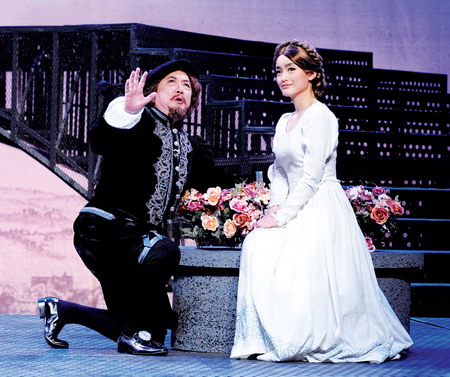Faust fulfills dramatist's dream
|
|
|
A scene from Xu's "Faust" [Global Times] |
A large-scale production of "Faust" in Mandarin will open for the first time in Beijing later this month following a reprise in Shanghai scheduled for Wednesday. The production is the culmination of 23 years of research by veteran Chinese director Xu Xiaozhong and is an adaptation of Goethe's "Faust Part One" written in 1806.
Premiering last year at the 10th China Shanghai International Arts Festival, the play focuses on the inner struggle and contradictions between Faust and the devil. It centers on the centuries-old legend of "Faust" and the belief that too much desire will eventually lead to disaster.
Former president of the Central Academy of Drama, 83-year-old Xu said that every dramatist holds an affinity with the character of Faust and many regard the production of Goethe's multi-faceted play as a milestone for their career.
Xu said that he became infatuated with "Faust" when he began to study Western drama history, commenting that a dramatist was sure to be regretful if they were not to contribute to the classic portrayal of Faust's emotional struggle.
In 1985, the founder of Shanghai People's Art Theater, Huang Zuolin, invited Xu to direct a Chinese version of Faust, however 20 years passed before their vision came to fruition.
"There are two parts of 'Faust' and my drama focuses on 'Part One.' As Faust faces temptation, the play unfolds into an inner search of oneself," Xu explained. "It starts with Faust's love for Gretchen but ends with him destroying her."
In his version of "Faust," Xu insisted on using poetic language to replace the colloquialisms of everyday speech.
"The drama 'Faust' directed by Lin Zhaohua in 1994 and 'Pirate Faust' directed by Meng Jinghui in 1999 were experimental dramas. The directors created the style and design of the plays via their imagination rather than sticking to the original work," Xu said.
"I am trying to present the original style of Goethe's work as much as possible and pursue its aesthetics and poetry in the original form," Xu added. His production is a mix of song, dance and poetry, a combination of romanticism, expressionism and realism.
The play makes use of a 1.8-meter high semicircular rotating table for the multiple scene changes, utilizing space and time to transition between spheres.
The integration of Franz Liszt's "Faust Symphony" and "Dream of Love" also emphasizes the origins of Goethe's base work.
Xu's stylized presentation of expressionism is aimed at producing an emotional response from the audience.
Zhu Jie, who recently starred in the popular TV show "Lurk" will play the heroine Gretchen, a pure and kind-hearted young lady. "It's my first time to be the leading actress on stage and I feel very lucky to be cooperating with the masters of the art," Zhu said.
"The actors that I have cast, like Xu Chengxian who plays Faust, have a very good understanding of literature. They deliver the poetical language beautifully and I trust that the audience will acquire a deep understanding of human nature through the play," Xu Xiaozhong explained.
Xu's 1987 production "Mulberry Village" is regarded as an important landmark in Chinese dramatic history. He created his own expressionistic style in the mid-1980s and helped cultivate famous directors Wang Xiaoying and Zha Mingzhe.
Now president of the National Theater Company of China, Wang said that in a similar vein to Peer Gynt, directed by Xu in 1983, "Faust" will be a true appreciation of a classic work.
Faust will play at the Shanghai Oriental Art Center on August 19 and 20 and at Beijing's National Center for Performing Arts from August 27-30.
(Global Times August 14, 2009)
 0 Comments
0 Comments








Comments